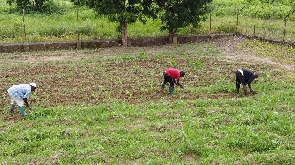Peasant farmers have lamented the austere economic conditions brought about by the International Monetary Fund (IMF) bailout.
“We were expecting to see radical measures that will ensure that the Planting for Food and Jobs policy delivers on its mandate but that hasn’t happened. Instead, as part of the IMF conditions, the government took off tax waivers that the sector actors were benefiting from. For instance we used to have tax waivers when you were bringing farm mechanization products; tax waivers on fertilizer, imported seeds, agrochemicals and veterinary medicines. All these waivers have been taken out,” says Executive Director of the Peasant Farmers Association of Ghana (PFAG), Dr. Charles Nyaaba.
He fumed that these decisions, taken without consultation and consideration of their potential negative impacts on food production and security, have worsened the plight of the smallholder farmer. He also said food prices, which continue to drive inflation up, will keep rising unless something is done to lower the cost of farm inputs.
Dr. Nyaaba spoke on the sidelines of a strategic workshop on the progress of the biennial review (BR) and the role of non-state actors (NSAs) in Accra and added that the country’s arrangement with the Bretton Woods institution is damaging farmers’ welfare.
The IMF impact
Parliament last year approved a series of financial bills, encompassing the Excise Duty Amendment Bill 2022, the Growth and Sustainability Levy Bill 2022, the Ghana Revenue Authority Bill 2022 and the Income Tax Amendment Bill 2022.
These legislative actions constituted a part of the government’s endeavour to enhance the mobilisation of domestic revenue, aiming to generate an approximate annual sum of GH¢4 billion. Moreover, these measures played a crucial role in supporting the government’s objective of securing Board Approval for the US$3 billion International Monetary Fund (IMF) Programme staff-level agreement.
Additionally, the government completely revoked the benchmark value policy related to import duties at the nation’s ports.
Consequently, the valuation of all goods will continue to align with the guidelines set forth in the World Trade Organization (WTO) valuation agreement, the customs valuation compendium of the World Customs Organisation, and sections 60 and 67 of Ghana’s customs act 2015 (act 891), pertaining respectively to used motor vehicles and general goods.
The Executive Secretary of the Peasant Farmers Association of Ghana (PFAG), however, noted that given the country’s unsatisfactory performance in food production leading to rising food inflation, farmers had anticipated that measures would be implemented to enable farmers to enhance their output, ultimately boosting food supply and mitigating inflation.”
He added: “But that wasn’t the case, instead the country’s engagement with the IMF is pushing farmers out of business.”
He revealed that due to the tax impositions on agro inputs, some importers who brought inputs in could not clear them at the port because of the high cost of importation and that those who were able clear their inputs have transferred the cost onto the farmer.
“Importation of agro inputs used to be duty-free. If you are bringing in tractors, fertilizer, seeds, veterinary medications, weedicides and pesticides you didn’t need to pay so much but now you have to pay so much due to the IMF conditions.
“This, has, therefore, made farmers worse off because the amount of money they needed to cultivate an acre has more than doubled twice and in some cases thrice for the same farm size. The sad part is that there’s no other country in Africa that has such crazy policy which is bringing agriculture backwards,” he lamented.
Smallholder farmers not given needed attention
For his part, Wepia Addo Awal Adugwada, the President of PFAG, expressed disappointment at the government’s recent mid-year budget review, particularly its lack of focus on the agriculture sector and the needs of smallholder farmers.
“As the mid-year budget has now been presented, we feel that our members and smallholder farmers were disregarded, as nothing pertaining to subsidized agricultural inputs was addressed—a matter of utmost importance to us,” he says.
He, meanwhile, encouraged the government to swiftly introduce the enhanced version of the Planting for Food and Jobs (PFJ) initiative. This, he emphasized, will enable farmers to access inputs on credit as the farming season commences.
“We had hoped that by this time, the enhanced PFJ initiative would have been approved. Once it is launched, smallholder farmers can then access credit for inputs, which would contribute to an increase in food production. Without such financial support, the consequence will be a reduction in the size of farms,” he says.
Business News of Tuesday, 15 August 2023
Source: thebftonline.com

















